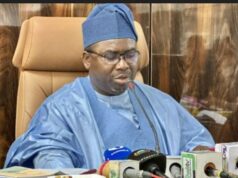 In recent times state Governors have unanimously approached the President for financial assistance for them to meet up with their obligations. especially the payment of workers’ salaries.
In recent times state Governors have unanimously approached the President for financial assistance for them to meet up with their obligations. especially the payment of workers’ salaries.
They came severally with caps in hand and have received assistance sought twice.
It will be recalled that it was state governors and their governments that forced the hand of the former President to share and more or less plundered the savings in the Excess Crude Account.
It is becoming clearer and more certain daily that unless a miracle happens many states will be unable to meet up with their financial obligations and may actually face imminent bankruptcy if the economic situation in the country worsens.
From time immemorial the economies of nations all over the world do go into recessions and more often not necessarily as a result of incompetence or lack of managerial capabilities of the administration that is in situation.
What is different in our situation, especially as it concerns the state governments is that the federal government appears to be dealing with the situation from the point of Compassion. Economic situations are better approached from point of strategic policy options and fiscal management techniques rather than a ‘father Xmas’ disposition.
Firstly, virtually ALL state governments in the country have an over bloated civil service. At some point between 2008 and 2009, Ogun state received N2b monthly from the federation account and paid out N1.8b as staff salaries, wages and overhead costs!!!! The total staff strength was about 50,000 while the population was about 5,000,000.
An obvious socio economic absurdity and incongruity therefore existed where 10% of the population was consuming 90% of the wealth of the state. We don’t need a sooth sayer or economic guru to foretell that this is unsustainable. In many States the percentage of the resources of the state that is consumed by the civil service ranges between 70% to 80% by not more than 10% of its population.
A basic economic dictum says ” if expenditure cannot be controlled then internal demands must be curtailed”
Without doubt therefore, all state governments must immediately start the process of down sizing with reasonable cushions for those who will be affected.
An immediate 20-30% cut down in staff strength is imperative, with provision of say, upfront payment of 3 years salaries for affected members of staff. If this is what the federal government will give as loans or bail outs to the States to be repaid over 10 years, it will make a better a economic sense than what has been done to date. This action will ensure that the states do not keep coming back as a recurring decimal.
This exercise of down sizing should be continued at an annual rate of about 10% for about 5 years. This will also create space for a controlled employment of new youthful and better trained civil servants.
All elected politicians want to build roads and improve infrastructural facilities in their states. The voters also judge performance by level of infrastructural improvement embarked upon by elected public officers.
In this period of economic downturn therefore we cannot expect that governors will be satisfied with just paying salaries. This is why many governors will rather award contracts for roads, bridges, schools etc and owe salaries for several months.
In considerations of this therefore it is necessary that the federal government creates a National Infrastructural Fund, to be managed by national and international experts. Both States and federal government can approach such agency for developmental funding at single digit interest rates.
Federal government may deploy money from the pension funds, as already suggested by the Hon minister for Works Babatunde Fashola. Multi lateral agencies can also be mobilized to commit to such funds especially if the federal government backs such requests with sovereign guarantees.
Finally the situation where a sitting state governor can commit the state to any volume of indebtedness, depending on his own financial satiety or avarice must be stopped forthwith.
It is not enough that the state assemblies must approve such loans, since in practice we know for a fact that 99% of all state assemblies are mere rubber stamps of the state governors. It is about time that the citizens who are not involved in the loan process, but who eventually are forced to endure the strangulating effects of the debt over burden,after the governors and legislators have left, are allowed to have a say in the process of loan approval.
The only way citizens can effectively participate in this and similar matters which directly affect their lives and well being, is through a REFERENDUM. An amendment to our constitution to allow citizens participation in such crucial affairs of state, at stste and national levels, is long overdue. [myad]






